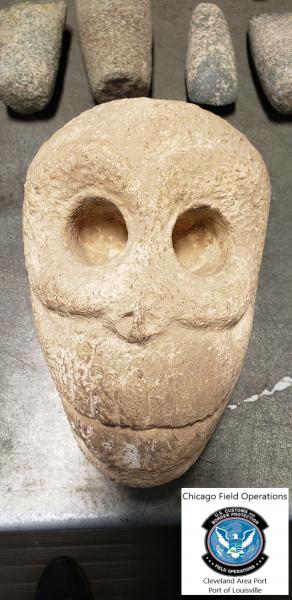Louisville, Kentucky - U.S. Customs and Border Protection (CBP) officers in Louisville with the help from officers at the National Targeting Center, Antiquities Unit intercepted a shipment containing 13 pieces of ancient artifacts from the 10th century on July 24.

The shipment was arriving from Mexico and was heading to a residence in Sumter, South Carolina. A subject matter expert in ancient Americas determined that the collection dated from Post-classic to the Aztec era, 1100 through 1532 AD. The collection included one skull and 12 adzes (tools for chopping).
“I’m extremely proud that our officers were able to stop priceless artifacts from being lost forever,” said LaFonda Sutton-Burke, Director, Field Operations-Chicago Field Office. “Customs and Border Protection will continue to use our border authority to identify and rescue precious antiquities being smuggled by those who profit on the theft of historical and cultural property and return them to their rightful owners.”
Most countries have laws that protect their cultural property, such as art, artifacts, antiquities, or other archeological and ethnological material. These laws include export controls and national ownership of cultural property. Therefore, although they do not necessarily confer ownership, consignees or importers must have documents such as export permits and receipts when importing such items into the United States.
The Department of Homeland Security enforces the cultural property import restrictions agreed to in bilateral agreements that the United States has concluded with 20 countries and through emergency import restrictions for three additional countries. These bilateral agreements protect cultural property by restricting U.S. import of certain categories of archeological and ethnological material, thus reducing incentive for looting at heritage sites. Read more about these bilateral agreements on importation of cultural property.
Since the beginning of fiscal year 2020 to now CBP has recorded 21 seizures of cultural property with a domestic value of over $18 million. CBP partners with Immigration and Customs Enforcement in the detection, interception, investigation, and repatriation of cultural property. Read more about ICE Cultural Property investigations.
CBP officers screen international travelers and cargo and search for illicit narcotics, unreported currency, weapons, counterfeit consumer goods, prohibited agriculture, and other illicit products that could potentially harm the American public, U.S. businesses, and our nation’s safety and economic vitality.